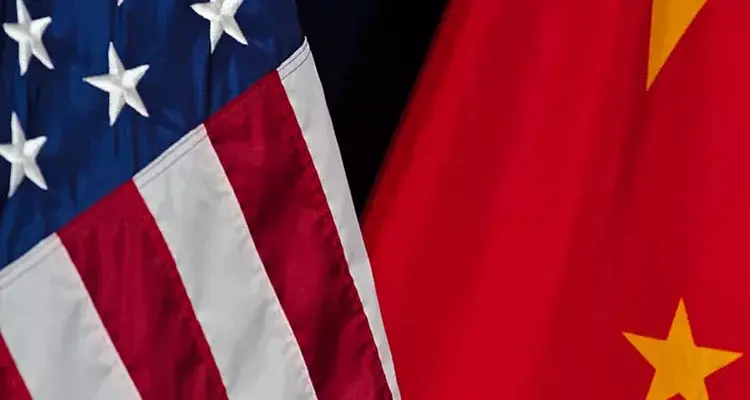The crisis in Ukraine continues as farmers prepare to plant crops this spring. And now there are...
U.S. & China Agree to Lower Tariffs for 90 Days

Bloomberg’s Jenny Leonard reported that “the U.S. and China will temporarily lower tariffs on each other’s products in a dramatic ratcheting down of trade tensions that buys the world’s two largest economies three months to work toward a broader agreement.”
“The combined 145% U.S. levies on most Chinese imports will be reduced to 30% including the rate tied to fentanyl by May 14, while the 125% Chinese duties on U.S. goods will drop to 10%, according to a joint statement and from officials in a briefing this past Monday in Geneva,” Leonard reported.
Treasury Secretary Scott Bessent said, “We are in agreement that neither side wants to decouple. We had a very robust and productive discussion on steps forward on fentanyl and talks might lead to China buying more American-made products. We would like to see China open to more U.S. goods. We expect that as the negotiations proceed, that there will also be the possibility of purchase agreements to pull what is our largest bilateral trade deficit into balance.”
Bessent added that the tariff reductions don’t apply to sectoral duties imposed on all U.S. trading partners, and the tariffs applied on China during the first Trump administration remain in place. Asked what would happen at the end of 90 days to avoid tariffs ratcheting back up, Bessent indicated “there’s a chance to extend the truce further.”
Bessent said he expects to meet with Chinese officials again in the coming weeks to continue trade negotiations.
How Tariff Pause Could Benefit U.S. Ag
The tariff pause with China could, at least temporarily, help calm some concerns from the U.S. agriculture industry over exports, with China remaining such an important customer for U.S. ag products.
Reuters’ Mei Mei Chu reported at the beginning of March that about half of U.S. soybeans, the country’s largest agricultural export to China, were shipped to the Asian nation in 2024, totaling $12.8 billion in trade, according to U.S. data. However, China has increasingly relied on cheaper and abundant Brazilian soybeans to reduce its dependence on U.S. supplies. This has resulted in the U.S. market share in China dropping to 21% in 2024 from 40% in 2016, according to Chinese customs data.
Overall, China imported $29.25 billion worth of U.S. agricultural products in 2024, a 14% decline from the previous year, extending a 20% drop in 2023. U.S. agricultural exports to China have declined since 2018 after Beijing slapped tariffs of up to 25% on soybeans, beef, pork, wheat, corn and sorghum in retaliation for duties on Chinese goods imposed by Trump.
In addition, Farm Policy News reported in October 2024 that United States corn and soybean farmers could lose billions of dollars in annual production value in the event of a potential new tariff-induced U.S.-China trade war, according to a new economic study commissioned by the American Soybean Association and the National Corn Growers Association and conducted by the World Agricultural Economic and Environmental Services.
The study found that U.S. soybean farmers could lose an average of $3.6 to $5.9 billion in annual production value while U.S. corn farmers could lose an average of $0.9 to $1.4 billion in annual production value depending on how China would respond to increased U.S. tariffs.
Some Non-Tariff Barriers Also Paused
Reuters’ Lewis Jackson reported that China also committed to removing non-tariff countermeasures imposed against the United States since April 2, although it remains unclear how some of these measures will be walked back.
As part of its retaliation in April, China added rare earths to its controlled export list, opened an anti-dumping probe into chemical firm DuPont’s China business and blacklisted some U.S. defense and tech firms, according to Jackson. “The wording of the agreement suggests those firms will be removed from the list, which barred trade and investment with China and the anti-dumping probe shelved.”
The statement only said countermeasures imposed after April 2 will be removed, which would therefore not include a dozen companies blacklisted in March, and the anti-dumping investigation into Google announced in February, Jackson reported.
EDITOR’S TAKE:
This is the “art of negotiation”. Give and take until an overall agreement is reached presumably in the not-too-distant future. The rollbacks negotiated over this past weekend will help bring down the tensions and hopefully create a better atmosphere for the negotiations going forward. I do think it is significant that China was the first party to wave the white flag and express willingness to discuss trade matters.
These talks and the eventual outcomes are of great interest to American farmers/ranchers. Having gone through a trade dispute during the first Trump administration was, to say the least, difficult. Farmers/ranchers much prefer to earn their income from the marketplace, not government payments.
I’m rather certain that farmers/ranchers will be in a much better mood now that things have calmed down for the time being. That said, this would be a great time to put all your truck inventory on AgTruckTrader.com®. Trust me when I tell you – their optimism will lead them to begin shopping around for new or used trucks with the belief that the U.S. and China will reach an agreement sooner than later!








